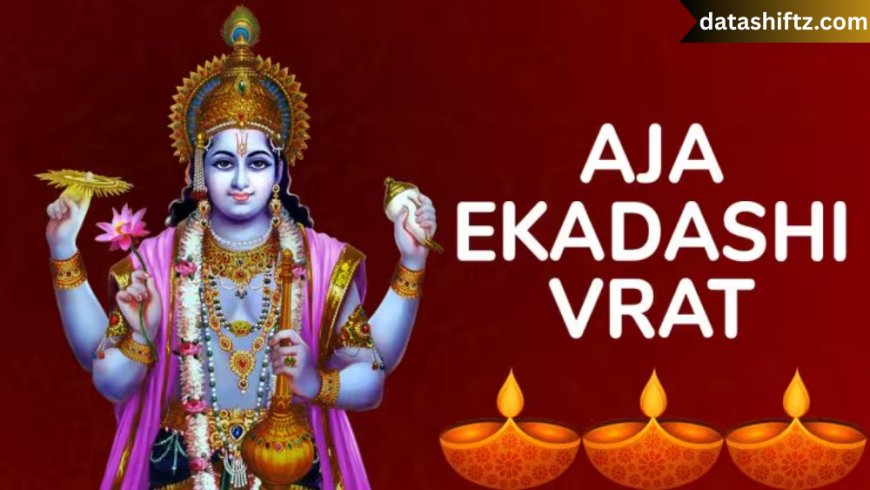Aja Ekadashi Vrat Katha: Significance, Rituals, and Spiritual Benefits

Introduction
Ekadashi, the eleventh day of the lunar fortnight, holds immense significance in Hindu tradition. Among the many Ekadashis celebrated throughout the year, Aja Ekadashi is one of the most sacred and spiritually potent. Falling in the month of Margashirsha (November-December), Aja Ekadashi is devoted to Lord Vishnu, the preserver and protector of the universe.
Observing the Aja Ekadashi Vrat (fast) is believed to purify the soul, absolve sins, and grant liberation (moksha) from the cycle of birth and death. Along with the vrat, the recitation of the Aja Ekadashi Katha (story) holds great importance as it narrates the origins, significance, and blessings associated with this fast.
This article offers a comprehensive guide to Aja Ekadashi Vrat Katha, including its spiritual meaning, detailed story, fasting procedures, and benefits. Whether you are observing this vrat for the first time or want to deepen your understanding, this post will enlighten your journey.
What is Aja Ekadashi? Understanding the Significance
Meaning of Aja Ekadashi
The term ‘Aja’ in Sanskrit means ‘the unborn’ or ‘eternal’, symbolizing the immortal nature of Lord Vishnu. Aja Ekadashi thus signifies the day dedicated to the eternal divine energy, encouraging devotees to seek liberation and spiritual growth.
Aja Ekadashi falls on the 11th day (Ekadashi) of the Shukla Paksha (waxing moon phase) in the Hindu lunar month of Margashirsha. Devotees observe a strict fast on this day and engage in prayer, meditation, and scripture recitation.
Why is Aja Ekadashi Important?
-
Spiritual Purification: Fasting and prayers cleanse the mind and body.
-
Liberation from Sins: Observance absolves even the gravest sins.
-
Divine Blessings: Lord Vishnu grants moksha and material prosperity.
-
Peace of Mind: Fasting fosters mental clarity and devotion.
-
Health Benefits: The fast detoxifies the body.
Aja Ekadashi Vrat Katha: The Sacred Story
The Story Behind Aja Ekadashi
Long ago, in the kingdom of Surasena, there lived a pious king named Harischandra. Despite his devotion to Lord Vishnu, he was tested with immense hardships and suffered the loss of his kingdom, wealth, and family. Overcome by grief and poverty, the king lost faith and wandered in despair.
One day, he met a sage who advised him to observe the Aja Ekadashi fast with sincerity and devotion to seek Lord Vishnu’s blessings. The king obeyed, fasting with utmost dedication on the day of Aja Ekadashi.
Moved by the king’s faith, Lord Vishnu appeared before him and restored his kingdom, wealth, and family. The king was also blessed with spiritual enlightenment and liberation from the cycle of birth and death.
This story teaches that sincere devotion and observance of the Aja Ekadashi vrat can remove all obstacles and grant eternal peace.
How to Observe Aja Ekadashi Vrat: Rituals and Procedures
Step-by-Step Guide to Observing the Fast
| Step | Description |
|---|---|
| Pre-Fast Preparation | Cleanse the home and body; take a holy bath before sunrise. |
| Morning Worship | Wake early; perform Ganesh and Vishnu puja. |
| Fasting Rules | Avoid grains, beans, and certain vegetables; consume only fruits, milk, and nuts. |
| Recitation of Katha | Listen or read the Aja Ekadashi Katha with devotion. |
| Meditation and Prayer | Chant Vishnu mantras and meditate. |
| Breaking the Fast | After moonrise or the next day post sunrise, break the fast with light food. |
Foods to Eat and Avoid During Aja Ekadashi
-
Allowed: Fruits, milk, nuts, sugar, potatoes, sweet potatoes.
-
Avoid: Grains, beans, lentils, rice, wheat, onions, garlic, and heavy meals.
Spiritual and Health Benefits of Aja Ekadashi Vrat
Benefits to Mind, Body, and Soul
| Aspect | Benefit |
|---|---|
| Spiritual | Purifies sins, grants moksha, and strengthens devotion. |
| Mental | Increases focus, calmness, and reduces stress. |
| Physical | Detoxifies the body, improves digestion and metabolism. |
Top 5 Spiritual Benefits
-
Cleansing of Past Sins: Sincere observance cleanses even severe sins.
-
Blessings of Lord Vishnu: Devotees receive divine grace and protection.
-
Path to Moksha: Helps in attaining liberation from the cycle of birth.
-
Improved Concentration: Fasting sharpens mental faculties.
-
Peace and Contentment: Fosters inner peace and spiritual satisfaction.
Common Questions about Aja Ekadashi Vrat
FAQs
-
Q1: Can women observe Aja Ekadashi fast during pregnancy?
A1: Pregnant women should consult their doctors and family elders; lighter fasting or partial fasting is advisable. -
Q2: What happens if one breaks the fast midway?
A2: It is recommended to continue prayers and observe fast the next Ekadashi to compensate. -
Q3: Is it necessary to fast strictly or can one do a Nirjala (water-only) fast?
A3: Devotees can choose either according to their capacity; both types are accepted. -
Q4: Can I observe Aja Ekadashi at home?
A4: Yes, home observation with proper rituals is highly revered.
Summary of Aja Ekadashi Vrat in Table Form
| Aspect | Details |
|---|---|
| Date | 11th day of Shukla Paksha, Margashirsha month |
| Deity Worshiped | Lord Vishnu |
| Fasting Type | Nirjala or partial fasting |
| Key Rituals | Puja, Katha recitation, meditation |
| Spiritual Significance | Liberation from sins and moksha |
| Popular Foods | Fruits, milk, nuts, potatoes |
| Common Benefits | Spiritual cleansing, mental clarity, health benefits |
Conclusion
The Aja Ekadashi Vrat is not just a day of fasting but a journey of spiritual awakening and inner cleansing. Rooted deeply in Hindu tradition, this vrata offers devotees a powerful opportunity to connect with Lord Vishnu, overcome karmic debts, and move closer to eternal bliss.
Observing Aja Ekadashi with devotion, following the rituals, and understanding the sacred katha can transform one’s life, bringing peace, prosperity, and divine blessings. Whether you are a seasoned practitioner or a beginner, this vrat encourages surrender, discipline, and unwavering faith in the divine.






























